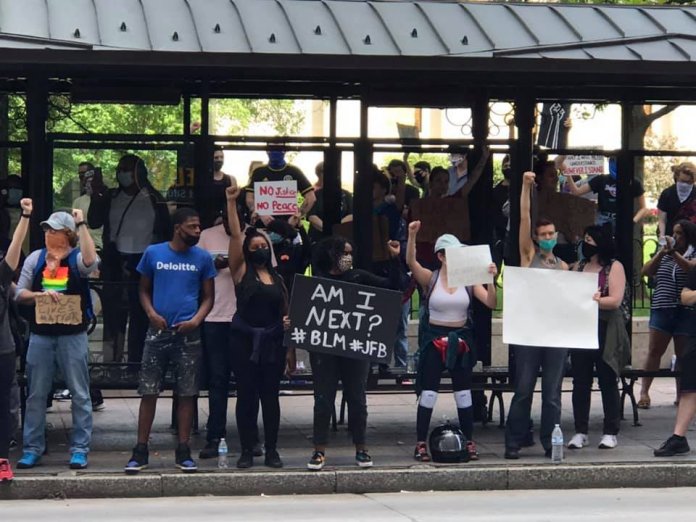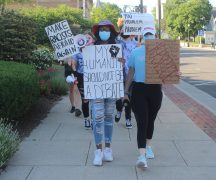By Susan Tebben
Three Ohio senators took time in between bill consideration to speak on the weekend’s protests and push forward consideration of a bill to make racism a public health crisis.
One of the sponsors of a senate concurrent resolution to declare the public health crisis stood up to ask for help from her fellow senators.
“We need your help, our people are being killed and nobody seems to want to do anything about it,” said state Sen. Sandra Williams, D-Cleveland. “I just ask you not to turn your back on black Americans who simply want to go to work, make a living, and take care of their families.
The bill only has seven Democratic cosponsors, and no Republican cosponsors. It has a companion resolution in the House.
Williams called out the protests that took place in response to health orders and against Ohio Department of Health Director Dr. Amy Acton. She noted the AK-47s that were brought to the Ohio Statehouse, weapons she used as a member of the military.
“Nobody did a thing to them even when they were banging on the doors,” Williams said.
But after a weekend of protests over the deaths of George Floyd, Breonna Taylor, Ahmaud Arbery, and others, she said law enforcement is “staging in the Atrium for what people might do.”
“All we need to do is treat people like human beings and they won’t be out there acting like animals, all they want is justice,” Williams said.
Minority Leader Kenny Yuko, D-Richmond Heights stood up as well after he and the resolution’s cosponsor, Sen. Hearcel Craig, D-Columbus,released a supportive statement over the weekend.
Assistant Minority Leader Cecil Thomas, D-Avondale, former officer in the Cincinnati Police Department, spoke of reforms Cincinnati implemented to “create a police department that works with communities rather than policing from the outside,” and address systemic issues within the city.
Thomas said many bills have come up for consideration to address police and citizen relations, and have not made it through the legislature. He said the lack of legislation to address underlying issues is unfair to police and citizens alike.
“When those officers are out there, when those citizens who are peacefully protesting are out there, they’re all in this situation together, and the only way we’re going to resolve this is we’re going to have to work together,” Thomas said.
Senate President Larry Obhof didn’t make a statement during session, but a Senate Majority Caucus Press Secretary John Fortney told the Capital Journal afterward “the resolution will receive full and fair consideration and President Obhof plans to schedule a meeting with OLBC members soon.”
The Senate resolution was referred to the Health, Human Services and Medicaid committee on Wednesday, and the House resolution has moved to the State and Local Government Committee.
***
Also from Ohio Capital Journal:
Commentary: Police are hurting protesters with little accountability
Social media is inundated with videos that show police attacking people in broad daylight with apparently little recompense. Videos that once would “go viral” of a police officer unduly macing someone, are now grimly ubiquitous. People protesting the killing of George Floyd in Minneapolis live-stream being shot at close range with huge rubber or wooden projectiles or being flash bombed with tear-gas.
In recent days, people have also started sharing videos and photos of cops kneeling with protesters. Are the kneeling officers a sign that police officers will be held accountable for the hurt they’ve caused in so many communities? Right now, that seems doubtful.
Consider that, in some cities, police officers maced, tear-gassed, and shot at protesters not long after posing for pictures. This happened in Columbus — one news outlet reported that the protests were “peaceful” and pictures with cops shaking hands with protesters dominated; yet a mere three hours later, police were back to macing and tear-gassing protesters and journalists.
Some may think it’s moving to see a few officers kneel with protestors, but we can not let the narrative shift away from holding police accountable. READ MORE
Commentary: Police officers accused of brutal violence often have a history of complaints by citizens
As protests against police violence and racism continue in cities throughout the U.S., the public is learning that several of the officers involved in the killing of George Floyd in Minneapolis and Breonna Taylor in Louisville share a history of complaints by citizens of brutality or misconduct.
Decades of research on police shootings and brutality reveal that officers with a history of shooting civilians, for example, are much more likely to do so in the future compared to other officers.
A similar pattern holds for misconduct complaints. Officers who are the subject of previous civilian complaints – regardless of whether those complaints are for excessive force, verbal abuse or unlawful searches – pose a higher risk of engaging in serious misconduct in the future.
A study published in the American Economic Journal reviewed 50,000 allegations of officer misconduct in Chicago and found that officers with extensive complaint histories were disproportionately more likely to be named subjects in civil rights lawsuits with extensive claims and large settlement payouts. READ MORE





